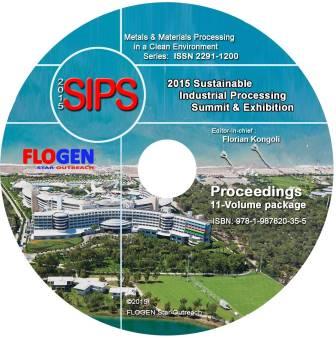2015-Sustainable Industrial Processing Summit
SIPS 2015 Volume 9: Physics, Advanced Materials, Multifunctional Materials
| Editors: | Kongoli F, Dubois JM, Gaudry E, Fournee V, Marquis F |
| Publisher: | Flogen Star OUTREACH |
| Publication Year: | 2015 |
| Pages: | 275 pages |
| ISBN: | 978-1-987820-32-4 |
| ISSN: | 2291-1227 (Metals and Materials Processing in a Clean Environment Series) |

< CD shopping page
Sustainable Mining: Is this an Oxymoron?
Marcello Veiga1;1UBC-MINING, Vancouver, Canada;
Type of Paper: General Plenary
Id Paper: 551
Topic: 42
Abstract:
Mining is not sustainable as mineral deposits have a limited life time. But the future of the mining industry is not doomed as the consumption of minerals increases as the population increases. As metals are in use, and demand is increasing, recycling cannot replace mining. In fact, less than 10% of the metals in demand are supplied by recycling processes.
Sustainability is a concept that integrates social, environmental and economic aspects. Mining can use these concepts to establish policies to move forward. This is a relatively new concept to a mining industry that used to assess technical-economic aspects first, then the possible environmental impacts and at the very end of a project, the social implications. This is changing. Social issues are increasingly recognized as significant inhibitors to mineral development projects. Increasingly, social risk is being recognized as a key factor determining the success of a mineral investment. Groups opposed to a mine for social or political reasons often use environmental impacts, real or perceived, to prevent mine development. These risk factors depend largely on cultural perceptions of mining activities and must be understood as such in order to be appropriately managed. A first step to addressing the sustainability of mining is inclusive, transparent and meaningful engagement of stakeholders who should not be simple viewers of a mining project implementation but participants in all decisions. This process allows stakeholders to understand what the other parties value in order to collectively establish a common currency for development and the creation of mutual value.
Expanding the scope of benefits and values a mine can bring is of increasing importance to mining companies. Training technical staff, engineers and geologists, who make initial and ongoing contact with local interests, in a holistic approach to mine development, is crucial to successful mineral development projects. Further extending this conversation to the general public, media governments and non-governmental organizations is a necessary step in developing a meaningful discourse on the benefit of mining activities.